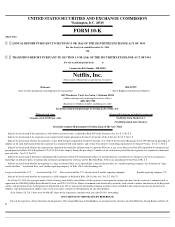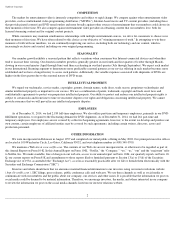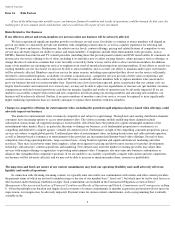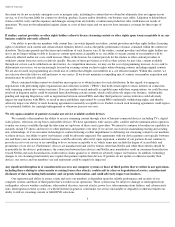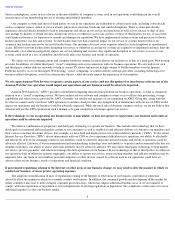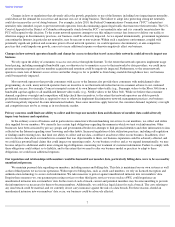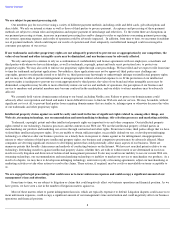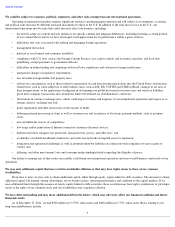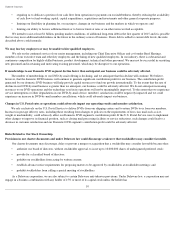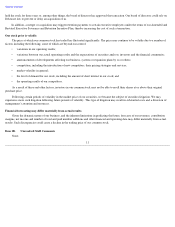NetFlix 2014 Annual Report Download - page 10
Download and view the complete annual report
Please find page 10 of the 2014 NetFlix annual report below. You can navigate through the pages in the report by either clicking on the pages listed below, or by using the keyword search tool below to find specific information within the annual report.
Table of Contents
Changes in laws or regulations that adversely affect the growth, popularity or use of the Internet, including laws impacting net neutrality,
could decrease the demand for our service and increase our cost of doing business. The failure to adopt laws protecting strong net neutrality
could also increase the cost of doing business. For example, in late 2010, the Federal Communications Commission ("FCC") adopted net
neutrality rules intended, in part, to prevent network operators from discriminating against legal traffic that transverse their networks. The U.S.
Court of Appeals for the District of Columbia subsequently struck down the FCC’s net neutrality rules and it is currently uncertain how the
FCC will respond to this decision. To the extent network operators attempt to use this ruling to extract fees from us to deliver our traffic or
otherwise engage in discriminatory practices, our business could be adversely impacted. As we expand internationally, government regulations
concerning the Internet, in particular net neutrality, may be nascent or non-existent. Within such a regulatory environment, coupled with
potentially significant political and economic power of local network operators, we could experience discriminatory or anti-competitive
practices that could impede our growth, cause us to incur additional expense or otherwise negatively affect our business.
Changes in how network operators handle and charge for access to data that travel across their networks could adversely impact our
business.
We rely upon the ability of consumers to access our service through the Internet. To the extent that network operators implement usage
based pricing, including meaningful bandwidth caps, or otherwise try to monetize access to their networks by data providers, we could incur
greater operating expenses and our member acquisition and retention could be negatively impacted. Furthermore, to the extent network
operators create tiers of Internet access service and either charge us for or prohibit us from being available through these tiers, our business
could be negatively impacted.
Most network operators that provide consumers with access to the Internet also provide these consumers with multichannel video
programming. As such, many network operators have an incentive to use their network infrastructure in a manner adverse to our continued
growth and success. For example, Comcast exempted certain of its own Internet video traffic (e.g., Streampix videos to the Xbox 360) from a
bandwidth cap that applies to all unaffiliated Internet video traffic (e.g., Netflix videos to the Xbox 360). While we believe that consumer
demand, regulatory oversight and competition will help check these incentives, to the extent that network operators are able to provide
preferential treatment to their data as opposed to ours or otherwise implement discriminatory network management practices, our business
could be negatively impacted. In some international markets, these same incentives apply however, the consumer demand, regulatory oversight
and competition may not be as strong as in our domestic market.
Privacy concerns could limit our ability to collect and leverage our member data and disclosure of member data could adversely
impact our business and reputation.
In the ordinary course of business and in particular in connection with merchandising our service to our members, we collect and utilize
data supplied by our members. We currently face certain legal obligations regarding the manner in which we treat such information. Other
businesses have been criticized by privacy groups and governmental bodies for attempts to link personal identities and other information to data
collected on the Internet regarding users' browsing and other habits. Increased regulation of data utilization practices, including self-regulation
or findings under existing laws, that limit our ability to collect and use data, could have an adverse effect on our business. In addition, if we
were to disclose data about our members in a manner that was objectionable to them, our business reputation could be adversely affected, and
we could face potential legal claims that could impact our operating results. As our business evolves and as we expand internationally, we may
become subject to additional and/or more stringent legal obligations concerning our treatment of customer information. Failure to comply with
these obligations could subject us to liability, and to the extent that we need to alter our business model or practices to adapt to these
obligations, we could incur additional expenses.
Our reputation and relationships with members would be harmed if our member data, particularly billing data, were to be accessed by
unauthorized persons.
We maintain personal data regarding our members, including names and billing data. This data is maintained on our own systems as well
as that of third parties we use in our operations. With respect to billing data, such as credit card numbers, we rely on licensed encryption and
authentication technology to secure such information. We take measures to protect against unauthorized intrusion into our members' data.
Despite these measures we, our payment processing services or other third party services we use such as AWS, could experience an
unauthorized intrusion into our members' data. In the event of such a breach, current and potential members may become unwilling to provide
the information to us necessary for them to become members. Additionally, we could face legal claims for such a breach. The costs relating to
any data breach could be material, and we currently do not carry insurance against the risk of a data breach. For these reasons, should an
unauthorized intrusion into our members’ data occur, our business could be adversely affected.
7


